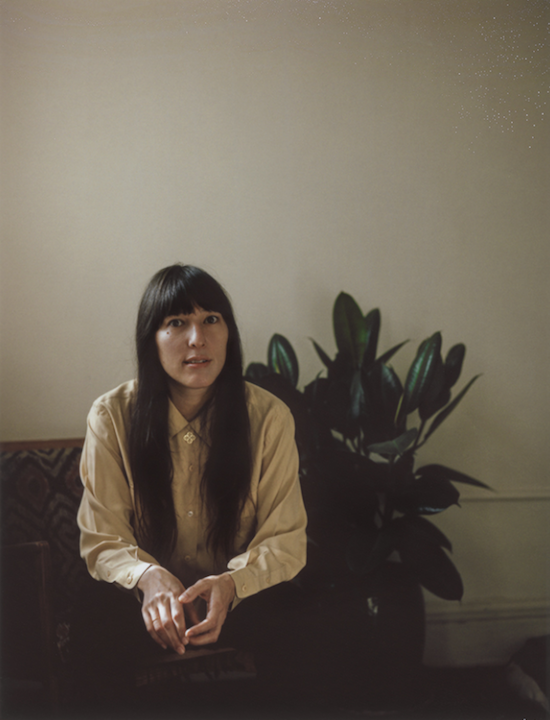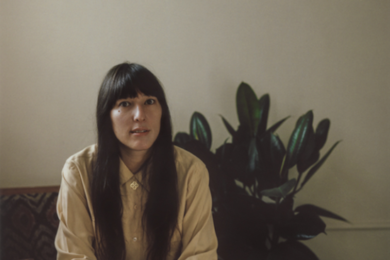Tomorrow (May 26), Nicky Mao will release Love Is The Capital, her stunning debut LP as Hiro Kone via the Atlanta-based record label Geographic North.
Following up the psychogeographic explorations of her 2014 cassette, Fallen Angels, the experimental techno and soundscapes of Love Is The Capital balance the righteous anger and mournfulness endemic to the American Now without succumbing to hopelessness or helplessness. Instead, Mao finds grace in the struggle, whether she’s offering a withering critique of our late capitalist moment with the help of Wetware’s Roxy Farman, or a clear articulation of optimism and bravery with her "close friend and collaborator of many years" Drew McDowall (with whom she’s releasing a collaborative album, The Ghost Of Georges Bataille, later this year on Bank Records).
During our interview, Mao, a former member of Sacred Bones post-punk outfit Effi Briest, explains that Hiro Kone "is the Iroquois phrase for ‘I have spoken’. It is used when signing off, and ‘kone’ attaches to it whichever intention one feels at that moment." It’s an especially fitting moniker for Mao’s project. Love Is The Capital embraces concision, but it communicates a wide array of feelings and ideas.
You can hear the record in full above ahead of its release and read on below for our conversation, in which we discussed her introduction to music and her shift from Effi Briest to Hiro Kone.
I’m curious about your background, and how you got into music.
Nicky Mao: My earliest memories are all attached to music, and my mom had really excellent post-punk and new wave records. We used to listen to them and dance around the living room together. I was an only child, and she was a nurse and single mother who really encouraged my creative side.
I grew up between San Francisco and Hong Kong. It was a very formative experience moving between one place and the other. In Hong Kong, I was mostly in the care of my Grandparents, who had a profound effect on me. But I always felt like I lived between two worlds, and being multi-racial, it was felt all the more deeply. At the time I felt very alone, but as I grew older, I think I realised that there was a freedom that I had because I didn’t fit in. A freedom to be anonymous, unidentifiable, and sort of a constant alien. Considering all of this, I never could sync up with other people’s expectations of me or societal pressures and norms, for that matter. I had experienced so much dislocation and precariousness as a child, how could one tell me that if I played by the rules I’d get from A to B? It was ludicrous.
[I was accustomed to] looking for that which existed outside of language and never feeling comfortable approaching the world through simple or dogmatic binary oppositions. There’s a sensitivity in my work that almost obsessively observes the presence found in absence, and in a sense, the more I explore this, the more I know myself. I’m as fascinated by the ambiguousness of the pause, as I am by the words that separate them.
Sonically, the shift from the post-punk of Effi Briest to your Hiro Kone project seems pretty significant. How did Hiro Kone come about?
NM: If I think about the music that most resonated with me as a child, it was soul music. When I came to New York City, I started DJing at dance clubs like The Hole and Luxx. Dance music – house, techno, soul – really brought together communities of colour, the LGBTQ community, women, people of all ages, and that’s where I felt most comfortable. I had also come up in the punk scene in the Bay Area, so the strong DIY ethos mixed together with the openness of the dance scene really solidified for me when I arrived here in NYC. This experience, sort of a homecoming, is definitely the root of Hiro Kone.
Effi Briest was in a lot of ways a fluke. And I don’t mean that in a negative way at all. I don’t think I ever thought it would become a serious thing. And when it did, and it sort of took off for a moment, it challenged everyone to ask themselves what they wanted out of it. In my case, I realised that it wasn’t for me, so I left before the Sacred Bones release. Hiro Kone was what I had wanted to do, but didn’t quite know it at the time, and I had to have that experience traveling and recording with Effi Briest to really understand that about myself.
As Hiro Kone, my first pieces of equipment were an MPC 500, a little Pro Tools interface, and a microphone. I was always obsessed with drums and low end – anything that really resonated in the gut. I used to bang on shit around the apartment, record and loop it. My early drum loops came about like that. Then I started cutting them up. My sound has progressed a lot from this, but it came from a very sincere place in which I was learning and teaching myself all these new things.
It seems to me that the major themes of the record are primarily articulated through its collaborations. Was this intentional? Were you always planning on approaching these themes through dialogue as opposed to monologue?
NM: I’m not sure that I conceptualised it as intentional, but I think it’s naturally a part of the discussion I’m continually having with myself. Like everyone, I’m just trying to navigate the sixth great extinction in a somewhat dignified way, though most of the time I think we are just bumbling around grasping for help – sometimes in sincere ways, but often in harmful, self-serving ways. That’s why I really like Donna Haraway. She brings together ecology with capitalism and the precariousness of the human species in a way that really makes sense to me. Rather than feel cynical about it, I feel heartened that we need to reimagine ourselves as not the focal point, but as a part of a much bigger web down to bacterial levels. She talks a lot about becoming-with-each-other. Humans’ obsession with their own subjectivity has become pretty boring to me. I want to know how we are going to exist amongst the lichen, how we are going to curb our consumption and live without certain things so that others can survive.
Can you tell me about the genesis of ‘Less Than Two Seconds’, your collaboration of sorts with the ghost of James Baldwin?
NM: ‘Less Than Two Seconds’ was written the afternoon the Grand Jury had declined to indict the officer that shot and killed 12-year-old Tamir Rice. At the time, I’d been reading a lot of James Baldwin and watching old interviews with him – this is before the documentary that has since come out. It was a way to pay homage to a child and his family who would not see the justice they so deserved, and a way in which to direct our attention to the brilliance and sadly too relevant work of Baldwin. I had been attending a lot of Black Lives Matter demonstrations following Mike Brown and Eric Garner’s murders by law enforcement.
I believe we need a complete take down of the system in order to even begin to address the systematic racism that exists in this country. Our so-called "liberal democracy" is built upon the backs of slaves and the genocide of its indigenous populations. It’s a mythology that serves those bred to protect it, and I’m not just talking about clear villains like our current president. Our whole apparatus is reliant on intelligence agencies, arms deals, and proxy wars to serve and to protect the very "liberal values" we espouse. I’m with Baldwin when he says, "I can’t believe what you say because I see what you do."
Love Is The Capital has been in the works for a while. It must be a weird feeling for these tracks to be more relevant now than they were two years ago. If that’s the case, can you speak to that?
NM: It is strange. I don’t want to be so forward to say that I called anything – there are a lot of folks smarter than me that have been making a lot of these connections for years – Haraway, Bataille, Bifo Berardi, Timothy Morton, Jacques Lacan, and Adam Curtis have all have helped me to interpret the signs along the way. If you listen, and you actually read the direction of where things are going, you’ll see where we are now is no surprise. It goes back to reading that pause, the ambiguity, what is left unsaid. I think people feel there’s something very wrong, they feel unnerved but they can’t quite put their finger on it. The lesson now is to stop piling on all the shit to make ourselves feel better. It’s no longer about that.
Love Is The Capital is out on May 26 via Geographic North. You can purchase it here



